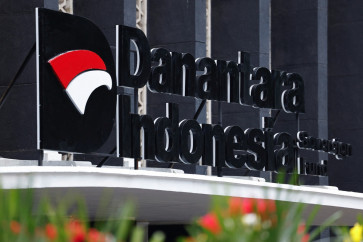Popular Reads
Top Results
Can't find what you're looking for?
View all search resultsPopular Reads
Top Results
Can't find what you're looking for?
View all search resultsStocks pass 4,000, rupiah advances on Moody’s upgrade
Indonesian share prices rose further on Wednesday after Moody’s lifted the country’s credit rating to investment grade, pushing up the market’s main price index and breaking the psychological 4,000 mark for the first time since August 2011The Jakarta Composite Index (JCI) gained 0
Change text size
Gift Premium Articles
to Anyone
I
ndonesian share prices rose further on Wednesday after Moody’s lifted the country’s credit rating to investment grade, pushing up the market’s main price index and breaking the psychological 4,000 mark for the first time since August 2011
The Jakarta Composite Index (JCI) gained 0.58 percent to close at 4,001 in active trading, while the rupiah advanced to its highest level in two months, at Rp 8,973 per US dollar, amid the surge in foreign fund inflows to the debt and equity markets, analysts said.
Local analysts, however, warned that the investment-grade euphoria might be overshadowed by the lingering debt crisis in Europe, which could trigger sell-offs at any time following negative news from the Western hemisphere.
“The financial markets may be very volatile and investors may become more risk averse due to the EU’s debt and banking-sector problems, although the upgrade to investment grade may bring some new investors to offset some of the outflow,” said Anton Gunawan, chief economist at PT Danamon Tbk.
Moody’s Investors Service upgraded Indonesia’s sovereign rating to investment grade on Wednesday on the back of the country’s improving economic fundamentals. This was the second upgrade, after Fitch Ratings lifted the country’s credit to investment grade last month.
Conservative global fund managers, overseeing investments like pension funds, required investment grade from at least two major rating agencies in order to invest their money, while conventional hedge funds had priced in Indonesia’s investment grade since last year, said Budi Hikmat, chief economist at Bahana TCW Investment Management.
“In the capital market, what needs to be anticipated is that after the news of a rating upgrade fades, the market will go down,” he said. “But for the longer-run, rating upgrades will be beneficial.”
To sustain the positive impact of the investment grade in the financial sector, local authorities must deepen the widely known shallow market, which is dominated by foreign investors, making it prone to external shocks, PT Bank Mandiri Tbk. chief economist, Destry Damayanti, said.
“It’s too early to expect a surge in capital inflows because of the lingering euro-debt crisis. But once the problems have been solved, and capital starts to flood in, the financial market needs to be deepened to avoid a bubble in prices,” she added.
Foreign investors, who control 60 percent of publicly traded stocks on the Indonesia Stock Exchange (IDX), have pumped in Rp 3.5 trillion in the first three weeks of this year, Rp 860 billion of which was traded during Thursday’s session alone.
The total trading value based on transactions reached Rp 6.86 trillion on Thursday, as opposed to the daily average so far this year of Rp 4.17 trillion, with basic industry, manufacturing, finance, and miscellaneous industries’ indexes taking the lead.
Blue-chip stocks pushed the index upward, with top automotive distributor PT Astra Internasional Tbk. gaining 1.29 percent to close at Rp 78,800 per share and state-run lender PT Bank Mandiri Tbk. jumping 2.16 percent to close at Rp 7,100 apiece.
Shares of consumer goods’ giant PT Unilever Indonesia Tbk. were up by 1.25 percent to close at Rp 20,250 a share, while other leading banks PT Bank Rakyat Indonesia Tbk. and PT Bank Central Asia Tbk. gained 2.16 percent and 0.63 percent, respectively, closing at Rp 7,150 and Rp 8,000 per share.
In the government bond market, gains were at a seven-week high on Thursday, as yields on the benchmark 7-percent bonds due in May 2022, fell 29 basis points, or 0.29 of a percentage point, to 5.68 percent.
Foreign investors increased their holdings in government bonds by Rp 60 billion to Rp 223 trillion as of Jan. 18, accounting for 30.7 percent of outstanding tradable bonds.
p-13










